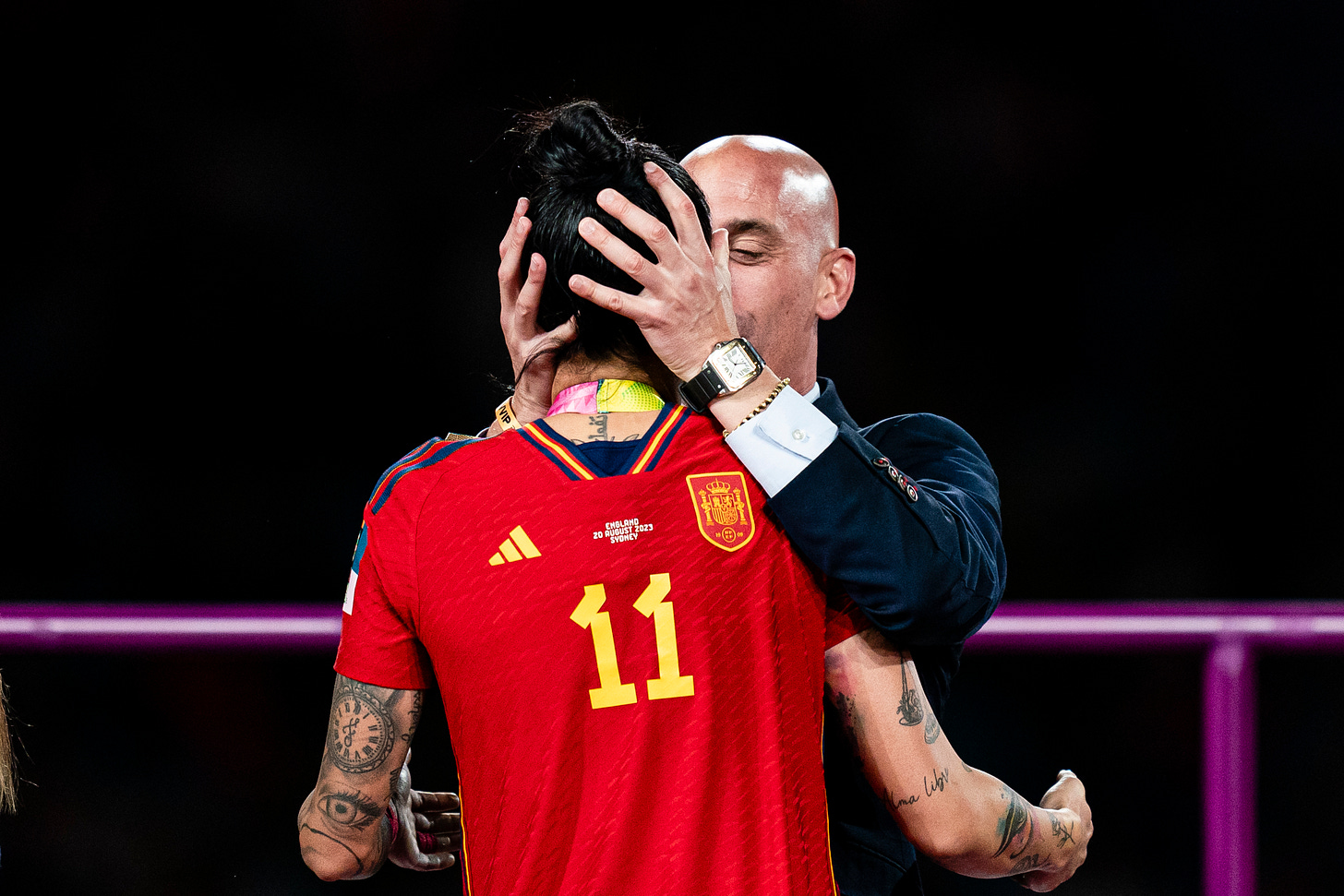One month on from Spain's win in Women's World Cup, their legacy goes far beyond football
La Roja's remarkable road to glory in Australia and New Zealand has barely been discussed – but the players have fought for real change following events in the aftermath

It has been one month since Spain’s footballers made history by beating England to win the Women’s World Cup in Sydney. Unfortunately, there has been hardly any focus on the enormity of an achievement which should be the pinnacle in a career of any player. Virtually nobody has been talking about the football.
The team’s triumph, achieved through admirable adversity due to long-standing disputes in the camp concerning the methods of coach Jorge Vilda, was a richly deserved reward for an outstanding generation of footballers who have had much to deal with. La Roja took on England’s Lionesses and completely dominated against the European champions. The 1-0 scoreline did not begin to tell the story.
And all over the pitch, there were wonderful stories: midfielder Aitana Bonmatí set the tempo suberbly and was the player of the tournament; precocious teenage winger Salma Paralluelo had halted a promising career in athletics to concentrate on football and helped Spain over the final hurdle; goalkeeper Cata Coll came into the team in the last 16 for her international debut and ended up as a world champion against all odds; and match-winner Olga Carmona spoke of the best and worst day of her life as she secured the title for Spain and then found out after the game that her father had tragically passed away in the build-up to the final.

Instead, though, the headlines were dominated by Spanish Football Federation (RFEF) president Luis Rubiales after the 46-year-old kissed the team’s all-time top scorer Jenni Hermoso on the lips during the on-pitch celebrations in Sydney.
And just like that, the actions of a man had overshadowed the brilliant achievements of a group of women. Two men, in fact – because Spain’s footballers had been fighting for change since last year, when 15 members of the squad staged a mutiny and refused to play in protest at the methods and treatment of coach Jorge Vilda. Three players, plus the injured Alexia Putellas, eventually returned. The other 12 did not. The coach had won. Hard to imagine he would have if it were a men’s team.
In Spain, many did not understand what all the fuss was about. Sports paper Marca compared Rubiales’ kiss to the one shared by Iker Casillas with his girlfriend – and future wife – Sara Carbonero in a live interview after Spain’s men won the World Cup in South Africa in 2010. Perhaps unsurprising from a media outlet which had called the women players ‘blackmailers’ after they refused to play for the team last year.

Rubiales himself initially described criticism of the kiss as “idiocy” and after mounting pressure, he issued one of those apologies where he basically said he was sorry if anyone was offended. A non-apology. And just when it seemed he would step down, he gave an extraordinary speech at a Federation Assembly in Madrid in which he vowed to stay on. “I am not going to resign,” he said. “I am not going to resign. I am not going to resign. I am not going to resign.”
Eventually he did. But only after claiming the kiss was consensual, calling Hermoso a liar when she said it was not, initiating legal action against the player, threatening to pull Spanish teams out of European competition and renewing the contract of the unpopular Vilda. He also asked female members of his family to defend him publicly, while his poor mother locked herself in a church and went on a hunger strike. It is fair to say he was not reading the room.
Many still seem to think – and some people I know have asked about this – that the reaction appears out of proportion. It was a kiss, amid some celebrations. What is the big deal? Aside from the fact that it was inappropriate, unsolicited, unnecessary and an abuse of power, it was also the tip of the iceberg: an action which symbolised the struggles of a group of supremely talented women working in a culture of misogyny and machismo. It was the straw that broke the camel’s back. Or as they say in Spanish, the drop of water which made the glass spill over. Se acabó. Enough was enough.

Alexia Putellas, Barcelona’s brilliant Ballon d’Or winner and the leader of this group on and maybe even off the pitch, led the revolution. “This is unacceptable. Enough is enough. With you team-mate, @Jennihermoso,” she wrote on Twitter. And goalkeeper Cata Coll perhaps summed it up best. “What a pity that us 23 players are not the protagonists,” she wrote. “Enough is enough.”
Another Barcelona player, Bonmatí, added: “We cannot tolerate this.” And amid protests all over the country, all of Spain’s coaching staff quit the following day – with the exception of Vilda. Soon, he followed, and then Rubiales resigned in an interview with Piers Morgan. As the drama continued, Spain’s women were winning.
But behind the scenes, how much had really changed? Montse Tomé was appointed as Vilda’s successor. She had been his assistant in the World Cup. It was hardly the change the players wanted. Was it really even a change at all? Tomé had applauded Rubiales in the Assembly and in an awkward press conference at her unveiling earlier this week, she seemingly told a pack of lies.
Had she spoken to all of the players? She said she had, yet many of them did not even know they had been called up for Spain’s forthcoming fixtures against Sweden and Switzerland and only found out on social media. Had any players refused to be called up? “No,” she replied, yet that was not true either. She also said she had left out Hermoso as it was “the best way to protect” her. “Protect me from what?” the player replied on social media. And on the applause for Rubiales, she said it had happened twice. In reality, she clapped seven times.

The majority of the players responded with a statement in which they reiterated that the changes had been “insufficient” and inisted that they were unwilling to be called up. Threatened with five-year international bans, they travelled to the camp against their will and on Tuesday night, talks went on into the early hours of the morning between the players, the RFEF and the CSD (the government’s Supreme Sports Council).
Following the summit, two players (Barcelona pair Mapi León and Patri Guijarro) decided to leave on Wednesday. The other 21 stayed. Meanwhile, coach Montse Tomé keeps her job for now, though her position is surely hanging in the balance.
Amanda Gutiérrez, president of player union FUTPRO, said: “It’s the start of a long road ahead.” And one month down that road, progress has clearly been made. It has already been described as Spain’s #MeToo moment and La Roja’s World Cup winners are just warming up as they look to change their sport, its culture and even attitudes across the country (where gender-based violence remains at a high, with over 1,000 women killed by husbands or boyfriends in Spain since 2003).
Hopefully, it will not be too long before we can all talk about Spain’s football again – because it is exceptional. But whatever happens next, the legacy of these World Cup winners will be much greater than the title they claimed in Australia on August 20th.




Great article Ben. Thanks for writing it as it needs to be acknowledged.